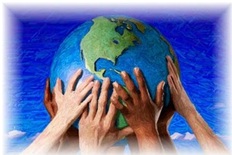|
 |
|
 |
Globalization
Globalization is... Global companies (like Coca-Cola and McDonald’s) selling the same product in the same way worldwide.
How to be a successful global company
1. Shared values (or corporate culture) The company’s culture must give every employee worldwide the same purpose, particularly to:
2. Sell successfully to Europe, North America and Asia Success (i.e. customer delight) in these three main markets of the world requires global
branding, selling something unique with brilliant customer
service (like Coca-Cola). A joint venture with a local company may be necessary to gain market knowledge or retail outlets in a particular country. China and India are particularly profitable and growing markets - pictured right is a McDonald's in China.
3. Hire the right people Managers in global companies must be internationalists (preferably fluent in the local language) who:
4. Think global, act local This strategy is sometimes referred to as “glocal” and combines:
5. Leadership The boss (chief executive) must
6. Be patient Instant success in an overseas market is unlikely, because it takes time to learn how to sell effectively there. For example, Disneyland Paris (pictured right) made years of losses before it became successful.
7. Accept cultural differences between countries Employees and customers may act and think differently in different countries. These differences must be taken into account and valuable lessons learned from other cultures.
Key quotes explained
“Sells the same things in the same way everywhere”, - Theodore Levitt (American marketing professor, pictured right) This is how Levitt defined a global company in an influential 1983 Harvard Business Review article. He invented the term “globalization”.
“The borderless world” ( the title of a 1990 book) - Kenichi Ohmae, Japanese management expert (pictured right). The world is borderless because competition between companies is global. Internet links also cross borders turning the world into what the Canadian, Marshall McLuhan, called a “global village”. To think internationally it helps to call yourself “a citizen of the world”, as the Greek
philosopher, Diogenes, did.
“Only if we together put some idealism back on the global agenda will there be a light at the end of the tunnel”, - Anita Roddick, the founder of the Body Shop.(pictured right) Global companies have a responsibility to help solve global problems like famine, poverty and climate change. They mustn’t exploit the weak and the poor. Jimmy Carter, the former American president, said: “If you’re illiterate and living on one dollar a day, the benefits of globalization will never come to you” .
Best books
Christopher Bartlett (pictured right) and Sumantra Ghoshal (pictured right below), Managing Across Borders (1989) A “transnational” company is best that:
Its structure (called an “integrated network”) is a mixture of functions for the whole organization (e.g. research and strategy) and activities (like production) in different countries.
Fons Trompenaars (pictured right), Riding the Waves of Culture (1993) Anglo-American culture and values shouldn’t be rigidly applied everywhere in the world. Much can be learned from other cultures: preference for working in groups, showing emotions, honouring the past and greater humanity at work.
Michael Porter (pictured right), The Competitive Advantage of Nations (1990) Four factors lead to international business success (called his “diamond model”):
a) resources (or factors of production) - particularly:
b) support from related industries (particularly the sharing of innovative ideas and knowledge).
c) competition (leading to the need for continuous innovation and quality improvement).
d) demand
Naomi Klein (pictured right), No Logo (2000) Global companies are social disasters because they:
C.K. Prahalad (pictured right), The Fortune at the Bottom of the Pyramid (2005) Globalization helps the world’s poor (the “bottom of the pyramid”) and the rich by making poor countries wealthier and so creating markets for companies in rich countries.
Geert Hofstede (pictured right), Culture’s Consequences (1980) Employees worldwide differ in four ways. Hofstede’s research showed that they have high/low influence in different countries:
a) power-distance (how autocratic and hierarchical management is) High (France, India, Belgium). Low (Germany, Denmark, Finland, Netherlands, Norway and Sweden).
b) uncertainty-avoidance (avoidance of uncertainty, innovation and risk taking) High (France, India, Belgium). Low (America, Denmark, Hong Kong).
c) individualism (respect for the individual) High (America, UK, Australia, Canada, New Zealand, South Africa, Ireland). Low (India, Pakistan, Taiwan, Thailand, Greece).
d) masculinity (emphasis on performance and results) High (same countries with high score for individualism). Low (Germany and countries with low power-distance).
Thomas Friedman (pictured right), The World is Flat (2005) Global capitalism (following the collapse of communism) and the Internet have minimized (or flattened) countries’ political, economic and cultural differences.
Thomas Friedman, Lexus and the Olive Tree (1999) Global society should balance the:
For more detail see Lexus and the Olive Tree in the Business Books section |
|
|
||
|
|
|
||
|
||
| Copyright © wisdomtowin.com All Rights Reserved | ||
|
















